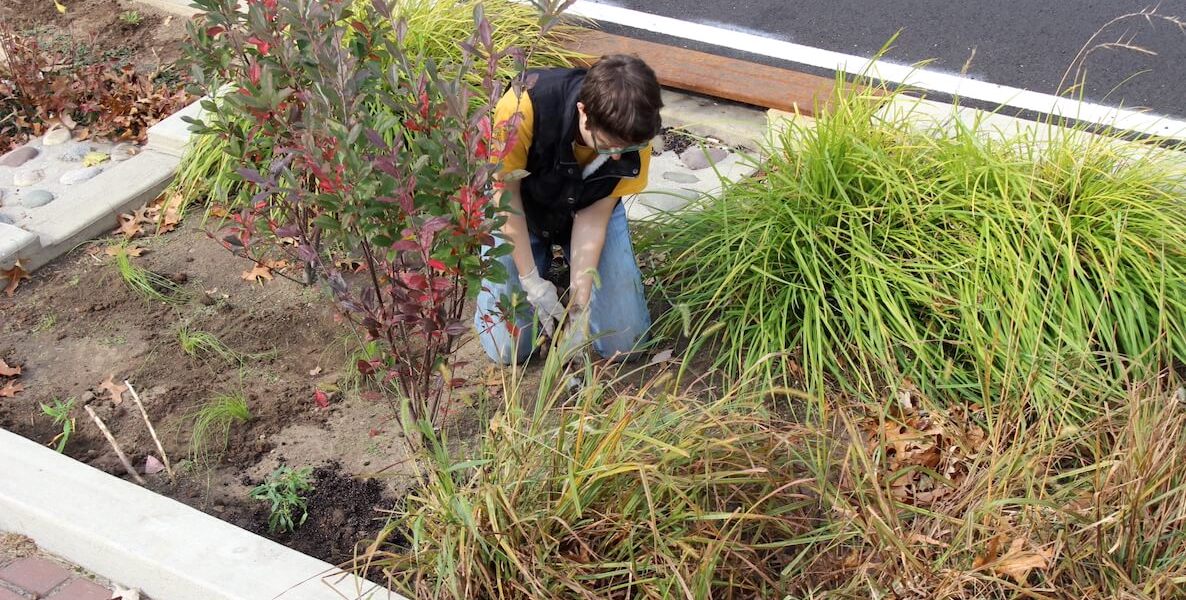On any given day in his North Philadelphia neighborhood, Leon Sanford can be found obsessing over his trees. He picks up trash, clears debris from drains, and makes sure these particularly special trees stay healthy. The neighbors thank him with friendly greetings, water on hot days, and vigilance when he isn’t around—they will pick up litter when they see it, and if they catch someone in the act, prepare for a scolding.
“I’ve always said the one thing we want to always do is take some ownership,” Sanford says. “We just have to communicate with those that live in the neighborhood. We see the same people, the elders, they see us, they know we’re there.”
Sanders is the Soak It Up Adoption program manager for Asociación Puertorriqueños en Marcha (APM), a Latino-focused health and economic development nonprofit near Temple University. APM adopted four tree trench sites, a form of green stormwater infrastructure (GSI), through the Water Department’s Soak It Up Adoption program, which partners with community organizations to help the city of Philadelphia manage stormwater runoff.
“Soak it Up Adoption gives these residents a chance to help keep their neighborhood clean. And it’s a way for us to literally put money in the pockets of organizations that want to do that,” Schupsky says.
Community groups “adopt” one or more GSI sites, taking responsibility for cleanup, maintenance and reporting to the water department. In addition, they are charged with educating the community about stormwater runoff and green infrastructure.
In a city of more than 1.6 million people, water management is essential to keeping citizens and property safe, conserving priceless resources and protecting the environment. Philadelphia sits on a watershed that encompasses more than 14,000 square miles and five states: Delaware, Maryland, New Jersey, New York and Pennsylvania. The city’s three treatment plants process 421,000,000 gallons of wastewater and runoff each day.
A key component of the city’s long-term water management plan employs GSI, which uses trees, plants, and stones to manage stormwater runoff by absorbing rainfall, filtering pollutants out of runoff, and slowing the flow rate into sewers.
These natural and semi-natural structures, such as rain gardens, porous pavement, planters, landscaped curb extensions called bump-outs and tree trenches, are built on a foundation of traditional or “gray” infrastructure (your sewer pipes and inlets, etc.). The benefits of using green tools in urban water management are more than just practical; Soak It Up Adoption capitalizes on engagement so residents can see the bigger picture of environmental protection.
Green city, clean waters
In 1987, the EPA amended the 1972 Clean Water Act to mandate that Philadelphia address the billions of gallons of untreated stormwater runoff that flowed out of the city every year into the Delaware and Schuylkill rivers. The city was charged with eliminating 85 percent of Philadelphia’s combined sewer overflow pollution through a consent order agreement, meaning failure to comply would result in steep fines.
Last year marked the 10-year-point for Green City Clean Waters, the city’s 25-year plan to achieve its pollution reduction goals. The project aims to restore local waterways and meet both state and federal water quality standards through green infrastructure and plant upgrades. Green City Clean Waters was the first EPA-approved plan in the country using GSI to address runoff and was lauded by environmental advocates, and the Natural Resources Defense Council for its strategy of using green tools that help prevent pollution of waterways rather than just treating it after the damage is done. It has become the basis for extensive research into water management and green infrastructure policy.
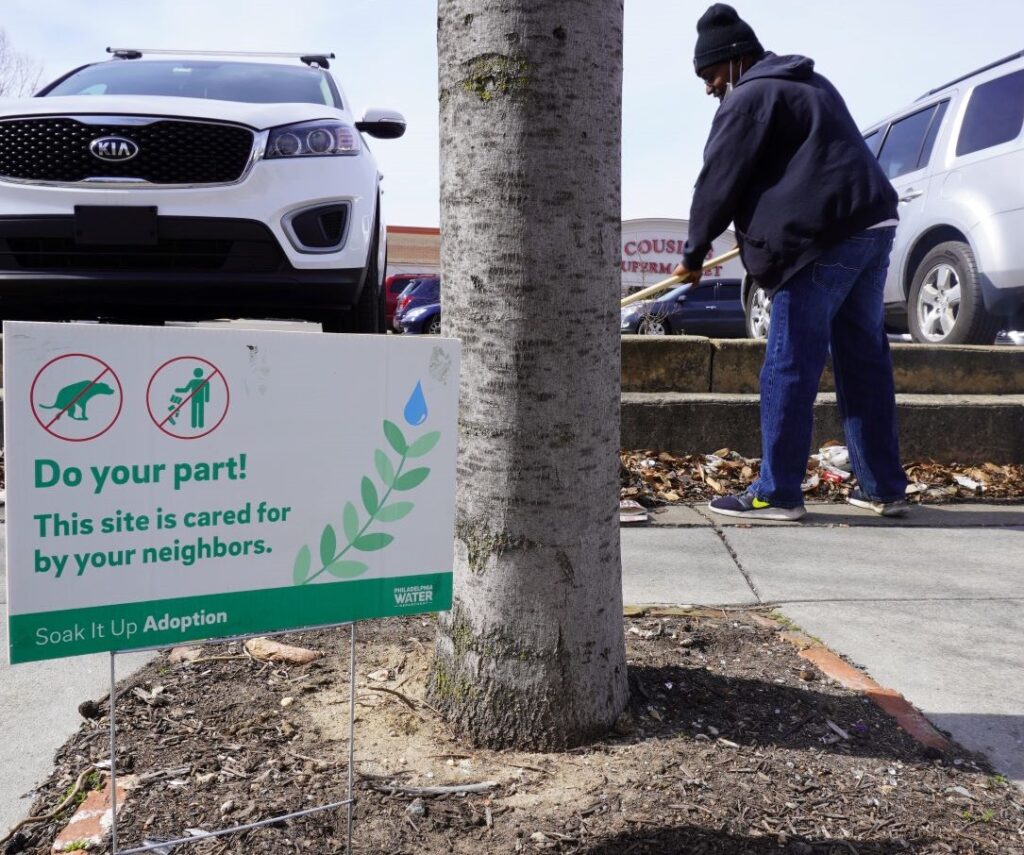
Daniel Schupsky of the Philadelphia Water Department (PWD) manages the department’s public engagement team, performs outreach in West Philadelphia around green stormwater infrastructure, and manages the Soak it Up Adoption program. He says several different plans went through cost-benefit analysis, including separating the existing combined sewer system and installing giant tunnels, as Chicago and Washington, D.C. have done. The disruption around what would be massive construction projects factored heavily into the decision-making process.
“The green approach was the best value for us, the ratepayers. It was the cheapest program to institute, and it had the most secondary benefits,” explains Schupsky.
Launched in 2013, Soak It Up Adoption is aimed at community-specific civic and environmental nonprofit groups. Adopted GSI sites are funded by small annual grants, which vary based on the number of sites the group agrees to maintain and the level of public engagement proposed, but average around $4,000. The program typically sees 10 to 15 adoption partners participating every calendar year, including groups like Make the World Better Foundation, Northern Liberties Neighbors Association, Roxborough Manayunk Conservancy, and many others.
Adopters must meet several eligibility requirements. First, they have to be a nonprofit, represent a specific community, and have a public GSI site within their borders. They must also be tax compliant with the city and free of delinquencies to the water department. PIDC administers the grants and reviews the eligibility of applicants. Once the application is approved, the group must participate in a training session and site tour before the first portion of the grant is paid, and the balance is distributed after the group has demonstrated reliability in maintenance and reporting, submitted all required reports, and complied with any audit requests.
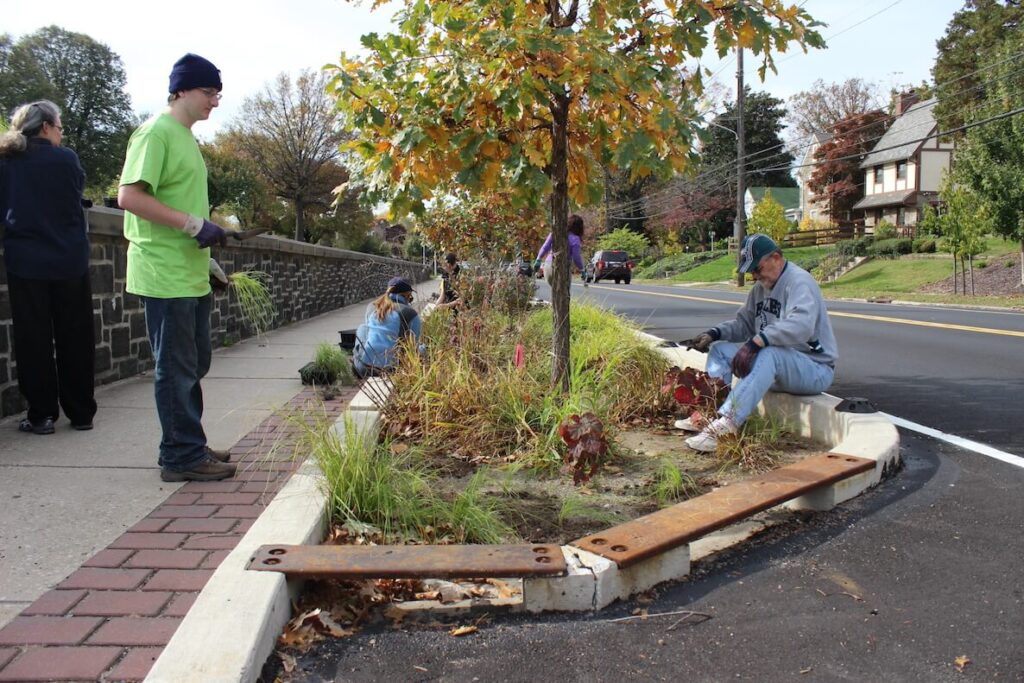
The grant covers maintenance costs to tend the site, weekly reporting to the PWD, and public engagement. Responsibilities include picking up trash and debris, monitoring the condition of the infrastructure to ensure that concrete isn’t damaged and fill is in place, and making sure drains aren’t obstructed. Any serious problems are reported to the water department.
Public education and engagement are required by the agreement, and community groups use a variety of tactics: presentations at meetings, social media posts, newsletter articles, arranging tours for visitors, residents, and students, holding workshops, and special events. The goal is to educate the public about the purpose and importance of these green spaces—not just for enjoying the outdoors but also for keeping waterways clean and decreasing local flooding.
“We have done workshops about stormwater drainage, collecting stormwater, rain barrels, and how construction can get drains clogged with dirt and debris,” Sanders says. “It’s about how we engage our neighbors into doing more positive things. Having Soak It Up is having people out there, boots on the ground, really doing the work, and you never see that. You can see the difference in the neighborhood.”
Untreated runoff threatens our ecosystem
Like many older US cities, about 60 percent of Philadelphia is served by combined sewer systems. These sewer pipes carry sewage and stormwater runoff together in one stream and rely on relief valves so that when the system is overwhelmed with heavier water volume after a storm, it doesn’t backflow into homes and businesses. Instead, the relief valves empty excess runoff into local waterways, bypassing water treatment plants.
Untreated runoff threatens clean water and whole ecosystems, carrying fertilizer, oil, pesticides, bacteria, and trash as it flows through ditches and storm drains into lakes, streams, rivers, and eventually the ocean. Urban areas pose a greater threat. They exist atop mostly asphalt and concrete rather than grassy, undeveloped, tree-covered open spaces, parks, and lawns, which soak up most rain and snowmelt.
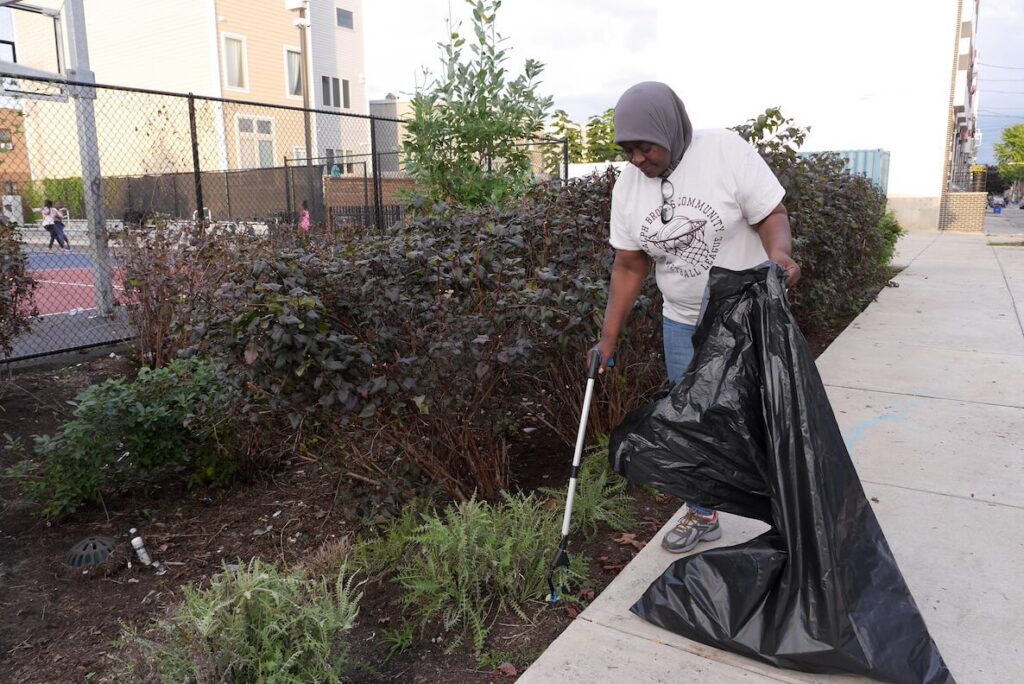
Traditional, or “gray” infrastructure, are the gutters, drains, and pipes that collect and carry stormwater and wastewater. The city’s plan requires both to adapt to changes in technology, usage and climate. “Sometimes you get into this green versus gray battle. We talk about it as a traditional foundation upon which the green is built,” explains Schupsky. “We could not make a robust green infrastructure program if we did not have a robust traditional infrastructure program. There’s a synergy there, and they must work in unison.”
Philadelphia receives around 44 inches of rain annually, potentially tens of millions of gallons of runoff for every storm event. Increased flooding and more frequent heavy rain events are in store for the future as the climate warms. The 2,500 green stormwater infrastructure tools all over the city manage 3 billions gallons of stormwater annually, Schupsky says.
“I’ve always said the one thing we want to always do is take some ownership,” Sanford says. “We just have to communicate with those that live in the neighborhood. We see the same people, the elders, they see us, they know we’re there.”
What makes GSI so ideal are the environmental, economic and social benefits of using them. Green tools are cost-effective, reducing infrastructure expenditure and generating jobs, increasing property values and promoting investment in local businesses. Plants and trees reduce carbon dioxide, filter pollutants from the air, and provide shade. Native plant species support birds, bees, and other important wildlife.
RELATED: 5 ways to “rewild” Philadelphia to revive the splendor of our natural habitat
GSI is meant to be a part of the built urban environment, not something you notice as a piece of water management. It beautifies public green spaces and inspires residents with a sense of ownership over the neighborhood, promoting recreation, healthy lifestyles and lowering the crime rate. Blocks with trees and plant life encourage people to go outside. The social and collaborative experience for residents maintaining their neighborhoods strengthens the community and local organizations.
Community groups take the initiative
Friends of Vernon Park (FOVP) and Tookany/Tacony-Frankford Watershed Partnership (TTFWP) maintain a rain garden in Vernon Park. Ruth Seeley is the president emeritus and Friends of Vernon Park rain garden lead. A retiree from the 2009 financial collapse, Seeley decided to devote her free time to get more involved with her community.
When the rain garden at Vernon Park was first conceived in 2010, Soak it Up Adoption didn’t exist yet, and FOVP was not particularly active. TTFWP worked with the water and parks departments, had an engineer assess the site, and even brought a botanist to identify the best native flora.
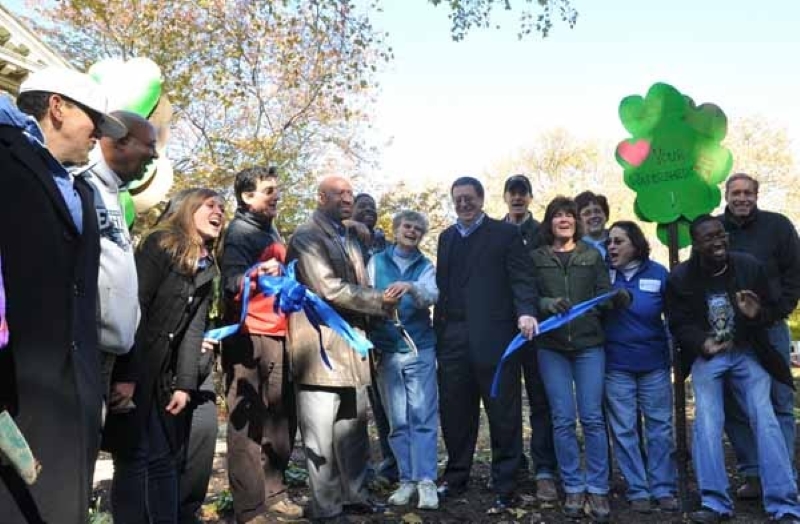
“I knew almost nothing about stormwater management, but I learned a lot from that,” Seeley says of the Green City, Clean Waters presentations that PWD delivered to community groups as it launched. “We had people come out and look at where the water was flowing. I think they identified between five and seven sites that would help. We’re surrounded by big roofs and parking lots, so a lot of the water is not from the park itself. It drains into the park, erodes the soil, and flows downstream. ”
The rain garden officially broke ground with a ribbon-cutting ceremony in the fall of 2011. Seeley remembers that she had to do some networking to recruit volunteers to help maintain the site. “Friends of Vernon Park had a group meeting when they were almost finished with getting the rain garden constructed,” she says. “They looked around the room and said, Who’s going to maintain it? And there were two of us. My friend who was nearly 80 by then, and me, who didn’t know much of what I was doing.”
When Soak it Up Adoption opened applications, FOVP applied. Today, the Vernon Park rain garden has matured, and volunteers work hard to remove invasive species and litter. “We really grew!” Seeley proudly asserts. “The core group is still only, you know, eight to 12 people, but we have a lot of other people who come out and work on events or come out for Love Your Park Day and that kind of thing. The community outreach has been pretty enormous.”
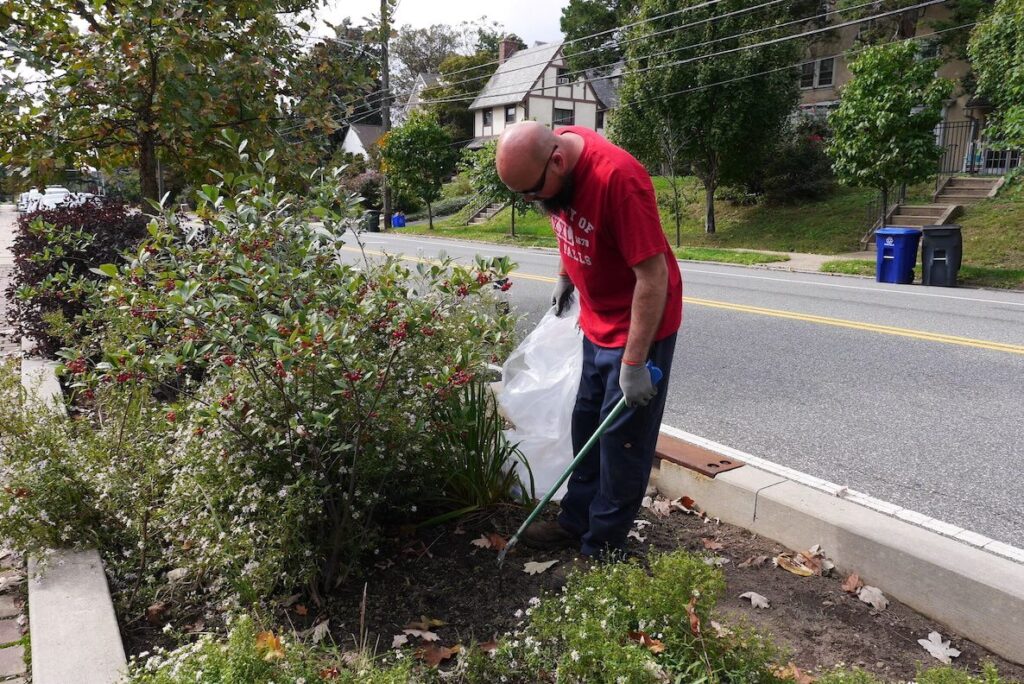
Before the pandemic, groups from elementary schools to colleges would bring students to learn and work in the garden. “It’s our intent to, whenever possible, talk to people about stormwater management, why we did it, and what you can do in your own garden or neighborhood,” Seeley says.
Leon Sanford’s team includes two other APM community connectors who live in North Philadelphia East. “What we have is tree trenches, but we handle the upkeep of life all around,” Sanders says. “We focus more on keeping it clear and making sure there’s no trash, but we’re also tree tenders. We’re able to look at some of the trees and know that’s a tree dying and needs your attention. We’re well-versed in that. So we put that on the weekly report.”
The reporting process is remarkably straightforward: PWD uses a Google form with checkboxes and spaces for notes and allows for pictures to be uploaded. “I try to make it as easy as possible. These are small organizations, so I try to keep it simple,” says Schupsky, who reviews each report every week.
Adopters are never on their own when it comes to pruning, planting, and underground pipes. “We maintain these systems in perpetuity, and we have a green stormwater operations team that will visit them on a regular schedule as well. So they get care from us professionally. We have subcontractors that help us care for them.”
Soak It Up Adoption sets an example for cities that are preparing for climate change, planning sustainable growth, and need a citizenry literate in issues that on the surface seem mundane like water management. A few years ago, Seeley spent a day with a visitor from Scotland who came to Philadelphia, Oregon and New York to see how US cities implemented GSI. She took him on a tour of the park and the rain garden, stayed in touch, and now he runs an environmental nonprofit in Edinburgh. “So we share stuff internationally now, I mean, this is the kind of stuff that makes being retired fun.”
“Soak it Up Adoption gives these residents a chance to help keep their neighborhood clean. And it’s a way for us to literally put money in the pockets of organizations that want to do that,” Schupsky says. “It’s for organizations who care about what their neighborhood looks like, care about stormwater management, care about the environment, and want to make a difference.”
![]()
RELATED



